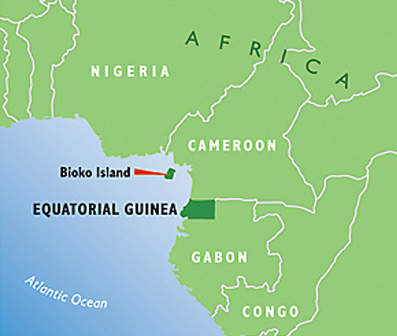
The Equatorial Guinea LNG project was constructed on the north-west side of Bioko Island at Punta Europa, near Equatorial Guinea’s capital city of Malabo.
Natural gas for the project is bought from the Alba field participants, Marathon Oil, Noble Energy and GEPetrol, and the LNG is sold to BG Gas Marketing (BGM), a subsidiary of BG Group, under a 17-year purchase and sale
agreement signed in late 2007.
BGM will purchase the LNG on a free-on-board (FOB) basis at Bioko Island, Equatorial Guinea, with pricing linked principally to the Henry Hub index.
BGM targeted the Lake Charles (Louisiana) import terminal as the primary destination for the LNG; however, the agreement provides destination flexibility for the LNG, enabling BGM to take advantage of prevailing market conditions at other global import destinations.
In May 2010, Equatorial Guinea announced that its natural estimates had tripled to 4.5 trillion cubic feet. With increase in gas estimates, the government is keen to start construction of the second train by 2016. A third train is also planned if pipeline imports could be arranged from Nigeria and Cameroon. Construction of a second methanol plant is also being planned by the government.
LNG plant costs
Total project cost is estimated at $1.4bn, of which approximately $1bn are engineering, procurement and construction costs, with the remainder comprised of owners’ costs, contingency and working capital.
The project has earned the distinction of being the fastest LNG project from initial concept to final investment decision. Construction was completed in 2007 with first deliveries of LNG taking place in May 2007.
Construction was completed in 2007 with first deliveries of LNG expected in late 2007. Marathon Oil controls 60% of the project with Compania Nacional de Petroleos de Guinea Ecuatorial (GEPetrol), the National Oil Company of Equatorial Guinea, holding a 25% interest.
Other interested parties include Mitsui & Co Ltd (Mitsui) (8.5%) and a subsidiary of Marubeni Corporation (Marubeni) (6.5%). These partners are the controlling interest in the Equatorial Guinea LNG Company (EG LNG).
Bioko Island Plant design
The LNG plant uses Phillips’ optimised cascade process (developed by ConnocoPhilips). Key plant facilities include: refrigeration systems, compressors, condensers, two LNG storage tanks and marine facilities that allow for the berthing, mooring and loading of LNG ships ranging in size from 90,000m³ to 160,000m³ of the membrane and spherical designs.
Bechtel was awarded the contract for the design and construction.
The contracted off-take rate is 3.4 million tonnes per year and the off-take term is 17 years. Efforts are underway to acquire additional gas supplies through exploration and commercial means in order to expand the usefulness of this LNG facility. The project is one of the lowest cost LNG operations in the Atlantic basin with an all-in LNG operating, capital and feedstock cost of approximately $1 per million British thermal units at the loading flange of the LNG plant.
Train 2
In August 2006 a front-end engineering and design (FEED) contract was awarded to Bechtel for the second LNG train. The scope of the FEED work for the potential 4.4 million tonnes per annum (mtpa)
Train 2 LNG project includes feed gas metering, liquefaction, refrigeration, ethylene storage, boil-off gas compression, product transfer to storage and LNG product metering.
Equatorial Guinea has the potential to serve as a regional gas hub, providing the means to commercialise the large volumes of stranded natural gas offshore in Equatorial Guinea and other significant gas resources in the Gulf of Guinea. This gas could be converted to LNG via a multi-train LNG complex and shipped to consuming markets in the Atlantic Basin.
The construction of Train 2 will rely on the securing of long-term gas supply agreements with the owners of surrounding gas resources. Discussions are underway with gas resource holders in Equatorial Guinea, Nigeria and Cameroon to secure the necessary gas supplies.
New gas
Exploration is still going at the Alba Field and the surrounding deepwater areas. In mid-2006 Noble Energy and Marathon announced a major natural gas and condensate discovery on the Deep Luba discovery well on the Alba Field.
The Bioko LNG plant could now be in for even larger production than previously planned. One of the Deep Luba well’s three pay zones was tested at a stabilised rate of 18.1 million cubic feet of gas and 1,000 barrels of condensate per day.
Bechtel construction challenges
The Bechtel construction team on Bioko faced a unique construction challenge. The work site is 60m above the ocean, so cryogenic pipes from the inland plant have to cross dense, sloped rain forest to get to the jetty where the LNG will be loaded onto tankers.
The team considered cutting through vegetation all the way down the slope and building a pipe-rack structure directly over it, but the moist, unstable soil and steep grade changes made construction dangerous. As an alternative they decided to build a 330m steel suspension bridge connected by one onshore and one marine tower.
The bridge is designed to carry 76cm diameter export and vapour return pipelines and utilities, and there is a walkway from the top of the bridge down to the LNG loading platform.



